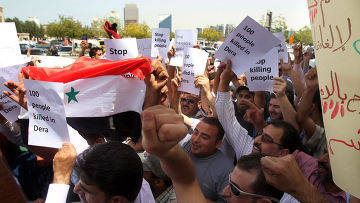Syria: US deal is around the corner
*(At present, the definition of “Mashrik” is used in Arabic, as a rule, as a collective designation of Iraq, Syria, Jordan, Palestine and Lebanon. Sometimes, Egypt is also included in this series.
The concept of "Maghreb" includes (from west to east): Western Sahara, Mauritania, Morocco, Algeria, Tunisia, Libya.)
The march of revolutions, which swept through East and North Africa, reached neighboring continents. Hugo Chavez, the president of Venezuela, fears that the spirit of "democracy" may soon reach the countries of Latin America. He is ready to give a fitting rebuff to the "imperialists," like Colonel Gaddafi. But at present, the thoughts of the White House administration are occupied by Syria, which is essentially the main political player Mashrik. Protestants on the streets of Syria demand immediate reforms and promise Bashar Assad that he will soon follow the path of Egyptian leader Hosni Mubarak.

Last weekend in the country were quite bloody, but the development of events in Syria is not as dramatic as in the same Libya. The center of mass demonstrations by opponents of the regime of Bashar Assad is concentrated in the north of Syria, in the port city of Latakia. There, protesters burned the Ba'ath headquarters (the ruling party of Syria) and the police station. Mass riots also took place in the south of the country. So, in Tafas, rioters burned several objects that were related to the current government.
All neighboring Arab countries were panicked. After all, if Damascus decides to go on the scenario, which played out Libya, then, with a high probability, NATO troops can quickly move to Syria. This will lead to the fact that countries bordering Syria can get into the very center of the hearth, which destabilizes the entire region. So, Lebanon, Turkey, Jordan, Iraq and Israel, from which Damascus has required the Golan Heights for many years, are worried that Bashar Assad will not be able to venture to take any action. The kings of Bahrain, Saudi Arabia and Jordan, the Turkish prime minister, the Iraqi president and the emirs of Kuwait and Qatar actually cut off the phone to Syrian President asking him to delay the implementation of reforms.
However, Bashar Assad himself is not trying to escalate the conflict. The situation in Syria is still complicated by the fact that Damascus is one of the cradles of Christianity, but the Muslim population prevails. And in the event of an external threat, the rebels can very easily turn their anger on Christians. Based on this, Assad understands very well that it is much easier to compromise with the rioters and America than to lose the wagons, high post, and maybe even life. In exchange for political and economic reforms, the United States promised that NATO troops would not cross the border of Syria. Based on the guarantees received, Bashar Asad began to establish contacts with his own population, which has been in a state of emergency since 63.
 Experience Bashar Assad in such matters do not need to borrow. His father, Hafez Asad, had already encountered a similar situation in the 80s. Then the Islamic fundamentalists "Muslim Brotherhood" developed anti-government propaganda, which led to armed conflict. But it is noticeable that times are changing, and in the Arab East, radicals stand behind opposition sentiments in the old way.
Experience Bashar Assad in such matters do not need to borrow. His father, Hafez Asad, had already encountered a similar situation in the 80s. Then the Islamic fundamentalists "Muslim Brotherhood" developed anti-government propaganda, which led to armed conflict. But it is noticeable that times are changing, and in the Arab East, radicals stand behind opposition sentiments in the old way.Clearly, riots are purely demonstrative in nature. The current president of Syria is very convenient in the role of the country's leader not only for the West, but also for the residents of this state. After all, it was Assad’s firm policy toward the United States and Israel that for a long time gave him a condescending attitude of citizens. And such a compromise with the White House will only play into his hands and strengthen his position.
Implementing such a scenario, the leader of Syria will not only receive immunity from members of the western coalition who are keenly watching developments in the East, but will also find a response among their fellow citizens, promoting anti-Israel sentiment. After all, the people of Syria remember very well the Golan Heights, which were occupied by Israel. Syria's allies are well aware that the “anti-Israel front” will fall and the deterrent Tel Aviv factor will disappear if the regime of Bashar al-Assad is overthrown. And so the Syrian president was advised to respond to street disturbances as quickly as possible. Otherwise, the Arab state may be among the trophies of the so-called "democracy", as warned by Hugo Chavez. This, in turn, can lead to the spread of the Islamic rebel fever far beyond the borders of an individual region.
Information